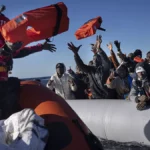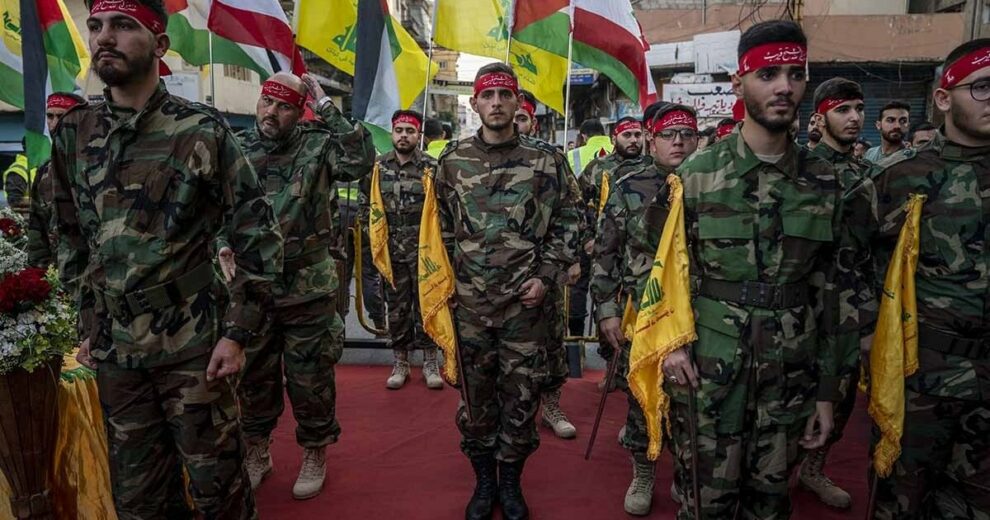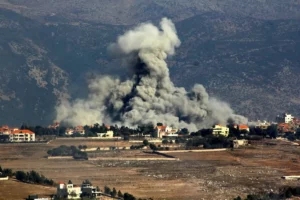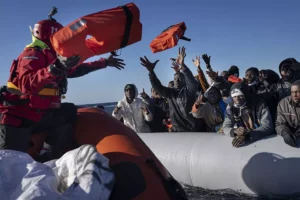Since the beginning of the Gaza war, Israel’s enemies have been outdoing each other with threats and fantasies of annihilation — and some are actively intervening to support Hamas.
The Lebanese terrorist organization Hezbollah fires rockets at Israel almost daily and terrorists have attempted to infiltrate the country through the northern border. Israeli communities near the border with Lebanon had to be evacuated.
Militants from Syria have reportedly come forward to support the fight against Israel. The Houthi in Yemen have officially declared war on Israel and targeted Israel’s south with long-range missiles and drones, which were shot down by a U.S. military ship. In Iraq, Shiite militias are attacking U.S. military bases. The Algerian parliament has voted unanimously for war against Israel.
And even in the most remote corners of Africa, militias are cheering the attacks on the Jewish state and offering their support to its enemies.
Iran is behind all these activities. The Shiite regime has spun a worldwide network of militias, which it supports with weapons, money and training, and in return uses for its own terror strategy — against the West as a whole and the United States and Israel in particular.
Reports by Western intelligence services and financial investigators, which Die Welt had exclusive access to, show that Tehran has been expanding its network for several years.
Iran no longer only supports Shiite and Sunni organizations, but even those that have no points of contact with Israel and fundamentalist Islam.
A good example of Tehran’s approach is the Polisario Front, a socialist militia based in the Tindouf refugee camps in southern Algeria. The Algerian-backed independence movement sees itself as the true representative of the indigenous people of Western Sahara, the desert strip that stretches along the Atlantic coast.
Meddling with Morocco
After a UN-sponsored ceasefire in 1991, the Polisario Front gave way when Morocco gained the upper hand. In 2020, however, it resumed the fight against Morocco. The group controls a small part of Western Sahara and maintains a camp in the Algerian province of Tindouf on the border with Morocco, which is home to around 150,000 ethnic Sahrawis.
Morocco broke off relations with Iran in 2018 because of its support for the Polisario Front. Hezbollah, Iran’s strongest militia, “sent military representatives to the Polisario and supplied the front with weapons and trained them in urban warfare”, said Moroccan Foreign Minister Nasser Bourita at the time. He alleged that Polisario members in Western Sahara had been supplied with surface-to-air missiles and drones by Tehran and that Hezbollah had set up camps in Algeria where it was training Polisario fighters.
Morocco says Iran helped organize meetings between the Polisario Front and Hezbollah through its embassy in Algeria.
While the leaders of the Polisario Front and Hezbollah denied the allegations, Morocco said it had an extensive file with detailed reports and satellite images of meetings between Hezbollah and Polisario representatives in Algeria.
Morocco claims that Iran also helped organize meetings between the Polisario Front and Hezbollah through its embassy in Algeria. A Polisario Front representative claimed last year that Iran, through Algerian mediation, was supplying them with “kamikaze” drones for use against Morocco.
Action against the Jews everywhere
New intelligence reports, which Die Welt has now been able to view, substantiate Morocco’s accusations. For example, Die Welt has had access to recordings and transcripts of telephone conversations between Polisario representatives and an agent posing as a Hezbollah contact from the Ivory Coast. According to the transcripts, Mustafa Muhammad Lemine Al-Kitab is the Polisario liaison in Syria and responsible for the Middle East.
Resistance is flaring up everywhere
In a recorded conversation on October 23, around two weeks after the attack on Israel in which Hamas slaughtered 1,400 people, the agent asked Lemine Al-Kitab about the situation. The Polisario man replied: “Praise be to Allah. The boys are encouraged by the victory of the resistance and the actions against the Jews and the victory over them everywhere.”
He continues: “I see that the resistance is flaring up everywhere. It has ignited in Gaza, it may break out in the Golan (…) and in the south (of Lebanon, editor’s note) and in the Shebaa Farms, and it will also break out in the Western Sahara and there will be a united resistance. Everyone will shoot from a different place (at Israel, editor’s note).”
Later in the conversation, the alleged Hezbollah representative and the Polisario envoy discuss possible joint attacks on Israel together with Hamas, Hezbollah, Algeria and Iran. Lemine Al-Kitab offers the support of the Polisario Front, but emphasizes that its resources are not yet sufficient to attack the Israeli embassy in Morocco, for example. In other talks, he asks for even more support from Hezbollah and Iran.
Dark financial networks
Earlier this year, Die Welt uncovered a hawala network operating out of Spain and the Tindouf camps in Algeria and maintaining close contacts with Polisario, Iran, Lebanon and Hezbollah.
Hawala is an old method of transferring money without using legal banks. For example, someone deposits an amount X with a “hawaladar” in Beirut. The latter informs his liaison officer in Algeria, who pays the amount to the recipient there without the money having moved. The “hawaladars'” cash holdings in Europe, Africa and the Middle East balance each other out — or are balanced out by smuggling cash, jewelry or expensive watches if necessary.
Iran disguises its financial aid to Hezbollah, Hamas and presumably also to the Polisario Front with the help of hawala networks whose cash flows are almost impossible to control.
Morocco as new Iran target
Thanks to its proxies, Iran has repeatedly attacked Arab states that are “too Western” in the eyes of the fundamentalists and are moving closer to Israel.
The socialist militia fighting against Morocco has become even more useful to Tehran since Morocco signed the Abraham Peace Accords with Israel. In return, the U.S. recognized Morocco’s claim to the Western Sahara. The North African state has thus become the focus of Iran’s attempts to destabilize the region.
Freedom will come at a high price, we will make sacrifices and have martyrs
And the Polisario are apparently arming themselves in their fight against Morocco. Two weeks ago, rockets were fired at residential areas in the town of Smara in the Moroccan-controlled Western Sahara. One man was killed and three others injured, according to the Moroccan authorities. The Polisario Front is suspected to be behind the attack.
Hamas also had started out “small” with short-range rockets aimed at Israel’s south. Their projectiles now reach the heart of Israel — and its terror squads have now managed on Oct. 7 to outwit the Israeli secret services.
Mustafa Muhammad Lemine Al-Kitab, the Polisario envoy for the Middle East, has already internalized the Hamas slogan: “This war is a war of jihad and resistance against the occupation and against the Zionist project,” he says in the recording of the telephone conversation on 23 October.
And he concludes: “Resistance has a price in the form of losses. We know that this freedom will come at a high price, we will make sacrifices and have martyrs, but in the end we will win.”
Source : World Crunch

















Add Comment